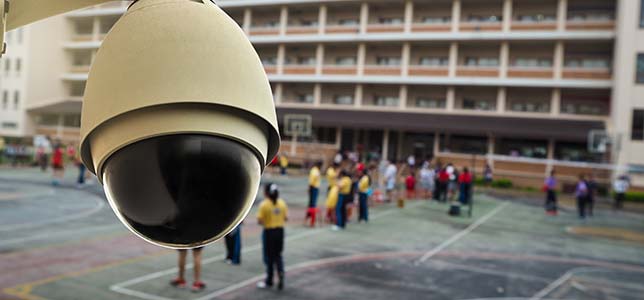Student Privacy in Surveillance Videos: Standards for Disclosure in Flux
- By Dian Schaffhauser
- 02/23/18

Does giving a parent a copy of a surveillance video showing a school hazing incident involving multiple students violate the terms of the Family Educational Rights and Privacy Act? That's one of the questions undertaken in a recent letter of guidance issued by the Office of the Chief Privacy Officer in the U.S. Department of Education.
The office received an inquiry about video recorded by a high school's surveillance system when a group of football players forced two students into the school's wrestling room while two of the players stood in the hallway serving as "look-outs." At least one of the victims received a black eye. While the school disciplined the troublemakers with suspensions and letters in their official files, some parents of the suspended students took issue with the punishment during a school board meeting last fall. One of those parents wanted copies of the video and witness statements.
FERPA protects the privacy of students' education records and the Personally Identifiable Information (PII) they contain. The federal law gives parents and students over 18 certain rights: to be able to "inspect and review" the education records; to seek amendments to the records; and to have some control over the disclosure of PII from the records. FERPA also prohibits districts from disclosing the records or the PII they contain without prior, written consent from the parent or eligible student, unless the disclosure meets an exception to FERPA's general consent requirement.
But what happens when the education records contain information about more than one student, like the video capturing a group's actions would, as in this case? In a previous decision, the Department of Ed asserted that a parent had the right to inspect and review any witness statement directly related to his or her student — even if it contained information directly related to another student — if the information couldn't be "segregated and redacted without destroying its meaning."
While redaction may work for written statements to some degree, it gets especially tricky when video is involved. In the more recent case ED noted that the parents of the "alleged perpetrator" would have the right "to inspect and review information in the video and witness statements," so long as the information about other students couldn't be pulled out without also making the materials meaningless.
This finding contradicts previous FERPA interpretations, according to an analysis by Melinda Kauffman, an education attorney at Pullman & Comley. "Prior guidance from the U.S. Department of Education directed that if the information on other students could not be redacted to mask the identity of the other students then the information could not be shared with the parent of another student," she wrote. "The current letter reverses that approach."
In its response, ED suggested the district "disclose only a portion of the video in a way that would fully depict the student's involvement in the hazing incident." A couple of other options — blurring the faces of other participants or showing segments of video that included only that lone student — were out of the running because the district considered the specialized software too expensive and there was no specific period in the video where a student's "singular involvement in the hazing incident" could be edited into a separate file.
Where redaction wasn't possible in the written records, the district was advised to get the consent of the parents of the other participants whose names might show up in the text.
However, disclosure of either record wouldn't require handing over copies of the materials, the department added — unless state law said otherwise. Under federal law, the parent at the root of the request only has the right to "inspect and review" the education records.
About the Author
Dian Schaffhauser is a former senior contributing editor for 1105 Media's education publications THE Journal, Campus Technology and Spaces4Learning.